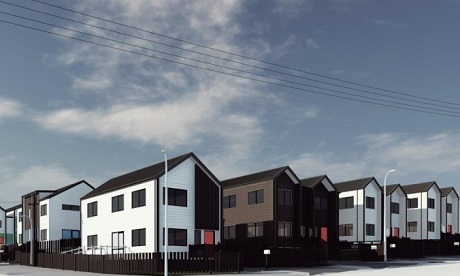Government plans to sell public and state house land to private developers risks making the outlook for tens of thousands of New Zealand families worse, says Monte Cecilia Housing Trust CEO Bernie Smith.
It’s been dubbed the sale of the century: in Auckland, 230ha to 270ha of public or state land is quietly being sold to private or sharemarket-listed developers, to build free-market homes across the city.
Large blocks of state land are being sold bit-by-bit in a 15- to 20-year plan. New state homes sit close to new privately-owned houses on recently-sold former state land.
“It’s a sad indictment of our country that even as 25-30,000 people are trapped living in temporary and transitional housing, the government is selling state houses to private developers,” says Smith.
“I understand they are selling it to fund long-term intensification plans, but this worsens the current problem, which is already at crisis levels, in the hopes of catching up later. The impact will be felt for generations in health, education and justice outcomes.”
He should know. The not-for-profit Monte Cecilia provides transitional and community housing to about 2000 families each year in the South and West Auckland areas.
Of particular concern to Smith are the children living in temporary transitional housing accommodation, like the 4000 motel rooms the government pays for. Four hundred of the 815 children currently in Monte Cecilia temporary accommodation are younger than seven.
Reducing public housing stock will force them to stay in these situations longer, he says.
“Transitional housing providers who promised to find a long-term home for families in three to six months now cannot fulfil that promise with the Government selling the housing supply line out from under us.”
He says it’s “not ok to say to the 10,000-plus children across our nation in temporary housing that ‘the State will sort it eventually’ because for decades they have not”.
Smith says the children are living in homes full of stress. They witness taxes, food and fuel costs constantly rising, pushing families into debt as they try to survive and work out how they are going to put food on the table.
“Sadly, these children often watch their parents go without food so they can eat,” Smith says.
“These children, who are in their formative years, are being traumatised by the feeling that nobody cares and they don’t count because they live the reality of poverty, hour by hour, day by day, running into weeks, months and now potentially years”.
Political point-scoring or promises don’t offer a future or hope, says Smith.
He does have a suggestion, though.
“The government must not go it alone.
“With the right mix of capital funding and long-term policies to unlock financing opportunities, we can work together to solve our housing crisis by building thousands more homes while developing strong healthy communities in safe, warm and secure housing”.
Source
